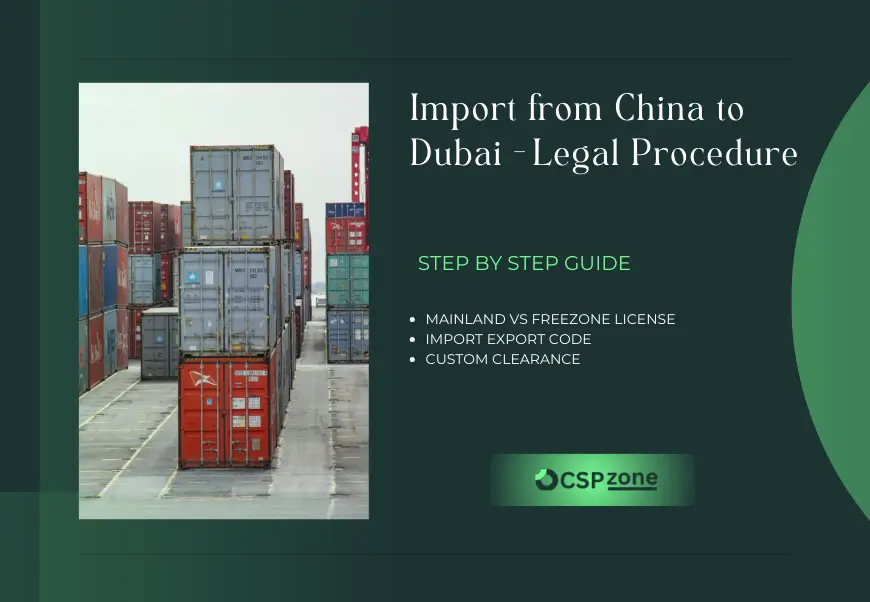


Importing products from China to Dubai has become one of the most profitable trade routes for entrepreneurs in the UAE. With China’s manufacturing capacity and competitive pricing, and Dubai’s position as a global logistics hub, the combination offers huge opportunities for wholesalers, retailers, and re-exporters.
However, importing goods is not just about buying at a low price and selling at a higher one. You must understand the legal requirements, customs procedures, and logistics to ensure smooth delivery and avoid penalties. In this article, we will guide you step-by-step through the process of importing from China to Dubai.
Dubai is a major re-export hub. The UAE has free trade agreements with many countries, low import duties, and one of the most efficient port and airport facilities in the world. Jebel Ali Port is the largest in the Middle East and serves as a gateway to Africa, the GCC, and beyond.
For importers, Dubai offers two key advantages. First, you can import goods for local sale or re-export them without heavy taxation. Second, if you operate from a free zone, you can store goods in bonded warehouses and only pay duty when goods enter the UAE mainland. This allows you to manage cash flow better and reach multiple markets from one base.
Before importing, you need a registered business in the UAE. Without a trade license, you cannot clear goods through Dubai Customs. The license should include your import activity.
You can register your company in two main ways. If you plan to sell goods within the UAE mainland, set up a mainland company under the Dubai Department of Economy and Tourism. If you plan to re-export or operate in international markets, a free zone company may be suitable. Popular free zones for traders include JAFZA, DMCC, and Dubai South.
You can get import export code also known as customs code, which is mandatory for importing goods. This code is issued by Dubai Customs and is linked to your company license.
Every product imported into the UAE is classified under an HS (Harmonized System) code. This code determines the import duty rate and whether special approvals are required.
For example, most consumer goods have a 5 percent import duty, but certain products like alcohol or tobacco have higher rates, and some items require pre-approvals from ministries. You can search for HS codes on the Dubai Customs website or request assistance from a customs broker.
When dealing with Chinese manufacturers, verify their credibility. Use platforms like Alibaba, Made-in-China, or attend trade shows such as the Canton Fair.
Before placing an order, request product samples and confirm specifications. Clearly agree on Incoterms such as FOB (Free on Board) or CIF (Cost, Insurance, and Freight). For most importers, CIF to Jebel Ali is common, as it includes sea freight and insurance, but you must check the exact cost breakdown.
Goods from China can be shipped by sea or air.
Sea freight is more cost-effective for large quantities, taking 25 to 40 days to reach Dubai. Air freight is faster, around 3 to 7 days, but more expensive. Many importers use sea freight for bulk shipments and air freight for urgent deliveries.
You can hire a freight forwarder to handle booking, documentation, and coordination with shipping lines. Major shipping routes from China to Dubai operate from ports such as Shenzhen, Guangzhou, and Ningbo to Jebel Ali Port.
Once your goods arrive, you must file a Bill of Entry with Dubai Customs. This process requires:
Customs will inspect the goods and assess duty. For most items, the standard import duty is 5 percent of the CIF value. VAT at 5 percent is also applied on the total value including duty.
Some products require approval from UAE government departments before customs clearance.
If you are unsure whether your product needs approval, consult with a customs broker or your business consultant before shipping.
After customs clearance, you can transport goods to your warehouse or directly to customers. If you have a free zone company, goods can be stored in the free zone warehouse until needed.
Dubai’s infrastructure makes distribution efficient. You can easily re-export goods to GCC countries by road or sea, and even ship globally from Jebel Ali Port.
Importing from China is profitable, but you must calculate all costs to determine margins. These include:
For example, importing goods worth USD 10,000 under CIF terms with a 5 percent duty and 5 percent VAT will cost approximately USD 11,025 after taxes, excluding inland transport.
Importing from China to Dubai can be a highly profitable business if planned well. The key is to ensure proper licensing, accurate HS code classification, reliable suppliers, and smooth customs clearance.
At CSPzone, we help entrepreneurs set up their trading companies in Dubai, get the right license, obtain customs codes, and manage the entire import process. We can also assist in supplier verification, freight arrangements, and regulatory compliance so that your goods reach Dubai without delays.
If you are ready to start your import business from China, contact CSPzone today for expert guidance.